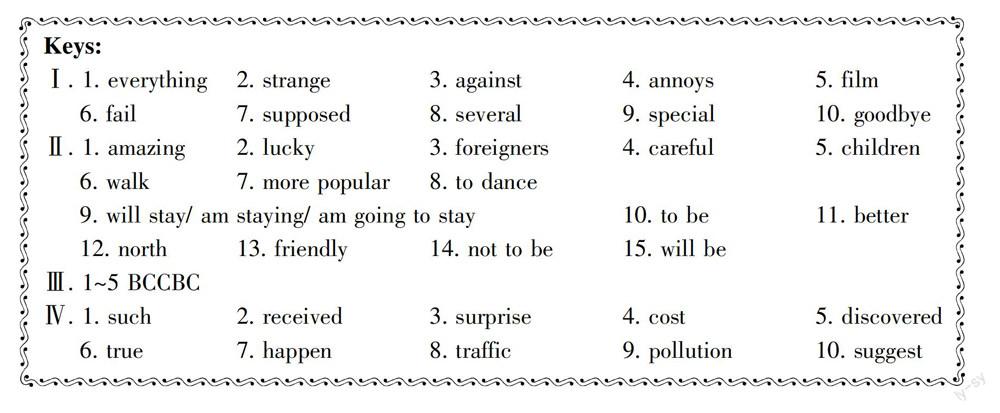新目标英语八年级 (下)重点词汇解读
王嵩


【名词】
(1)message意为“消息;信息;口信”。give sb. a message给某人一个口信;take a message for sb.替某人捎个口信;leave a message for sb.给某人留个口信。
(2)room作可数名词,意为“房间”;作不可数名词,意为“空间”,相当于space。例:
There is no room on the bus. 公共汽车上没有空地方了。
(3)pair通常指成对出现的物品。a pair of意为“一双(副)……”,后面接复数名词。如:a pair of shoes/ socks/ glasses 一双鞋子/袜子/一副眼镜。
【拓展】当a pair of...作主语时,谓语动词的单复数情况通常与pair的单复数保持一致。例:
That pair of pants is mine. 那条裤子是我的。
(4)voice意为“声音”。指人的噪音或说话、唱歌发出的声音。如:in a loud voice 大声地
【比较】sound泛指人们听到的“声音”,可以指人和动物的声音,也可以指物体碰撞发出的声音或指大自然的任何声音。而noise则指人们不愿听到的、不悦耳的“噪音”,即:嘈杂声、喧哗、吵闹等。如:make so much noise 大声吵闹。
(5)population意为“人口”,作主语时,谓语动词要用单数形式。另外,population可以用large, great以及small来修饰,但不能用many, much来修饰。例:
The population of Australia is smaller than that of Canada. 澳大利亚的人口比加拿大的少。
【拓展】询问某地人口的多少要用疑问词what,而不能用how many或how much。例:
What is the population of this city? 这个城市的人口是多少?
【动词】
(1)happen是不及物动词,意为“(偶然)发生”,主语一般是物,而不能是人。例:
This happens every night. 这件事每晚都发生。
【拓展】happen to sb./ sth. 表示“某人怎么了或某物怎么了”。例:
Can you tell me what happened to him yesterday? 你能告诉我昨天他怎么了吗?
(2)annoy意为“使……生气,使……烦恼”。例:
What annoys you most when youre shopping? 你在购物时,什么最让你恼火?
【拓展】① annoyed是形容词,意为“(某人感到)恼火的;恼怒的”。be/ get annoyed with sb.
意为“生某人的气”;be/ get annoyed to do sth.意为“做某事感到生气”。
② annoying也是形容词,意为“令人气恼的;令人心烦的”。
(3)receive意为“收到;得到”,常指收到礼物或来信等。
【拓展】表示“收到某人的来信”还可以表达为:get ones letter, get a letter from sb., hear from sb.等。
(4)cost意为“花费”,表示“某物花费某人多少钱”,其主语一般是物,常用于结构:“sth. cost sb. + 钱数”,通常没有被动语态。
【拓展】① spend指花费钱财、时间,其主语一般是人。常用于spend time/ money on sth.或spend time/ money in doing sth.的结构中,其中介词in常常省略。
② take常用于“It takes sb. some time to do sth.”结构,表示“某人花多长时间做某事”。
③ pay意为“支付”,主语是人。通常用sb. pay some money for sth.结构。
【形容词、副词】
(1)alone用作副词,意为“单独地;孤独地”,强调独自一人,没有别的同伴。例:
For years the old man lived alone. 几年来,那位老人独自生活。
【比较】lonely用作形容词,指的是一种感觉,具有感情色彩,缺乏友爱和帮助,感到寂寞,意为“孤独的;寂寞的”。如:feel lonely感到孤独的。
(2)asleep用作形容词,意为“睡着的;熟睡的”,在句中常用作表语。如:be asleep睡着的;fall asleep入睡。
(3)instead用作副词,意为“代替;而不是”,但通常不译出,位于句首或句尾。
【兼类词】
(1)surprise
① 作动词,surprise sb.表示“使(人)惊奇;使(人)感到意外”。
② 作可数名词,意为“惊奇;惊讶”。in surprise吃惊地,惊奇地;to ones surprise让某人吃惊的是。
(2)several
① 作形容词,意为“几个的;数个的”,用来修饰可数名词。如:several languages 好几种语言;several times 好几次。
② 作代词,意为“几个;数个(人或物)”。例:
Several of us decided to walk home. 我们中有几个人决定步行回家。
(3)return
① 作不及物动词,意为“回来;返回”。如:return from work 下班回家。
② 作及物动词,意为“归还;退还”。 return sth. to sb. 把某物归还给某人。
③ 作名词,意为“返回;报答”等。例:
He made a return for her kindness. 他回报了她的好意。
(4)neither
① 作代词,意为“两者都不;两者之中任何一个都不”。作主语时,谓语动词一般用单数形式。例:
Neither of the sweaters is good. 两件毛衣都不好。
② 作形容词,意为“两者都不;两者之中没有一个”,所修饰的名词用单数。例:
Neither answer is right. 两个答案都不对。
③ 作连词,意为“也不”。例:
He cant swim. Neither can I. 他不会游泳,我也不会。
【训练基地】
Ⅰ. 根据句意及首字母或汉语提示补全单词。
1. Money is important to us, but money isnt e______.
2. The man wears a skirt in the cold weather. How s______ he is!
3. My parents are never a______ that I watch TV on weekends.
4. It always a______ me when the men around smoke.
5. Ive ever seen an exciting f______ called The Lord of the Rings.
6. If you dont want to ______ (失败) in the exam, you shall study hard.
7. Dont be late again. You are ______ (理应) to get to school on time.
8. My uncle has been raising money for charity for ______ (若干) years.
9. How about sending her a ______ (特别的) gift?
10. The little boy always says ______ (再见) to his parents when he goes to school.
Ⅱ. 用括号中所给单词的适当形式填空。
1. Its ______ (amaze) that an alien came to our school yesterday.
2. What a ______ (luck) boy! He has won a prize to travel to Japan.
3. Why not invite the ______ (foreign) to our house? They look friendly.
4. We should be ______ (care) when we give others suggestions.
5. Not all ______ (child) like toys. We might send this girl some flowers.
6. Japanese companies have already made robots ______ (walk).
7. The football player is ______ (popular) than you.
8. He invited her ______ (dance) for me.
9. I think I ______ (stay) at home tomorrow.
10. My sister would like ______ (be) a movie star.
11. Which do you like ______ (well), this one or that one?
12. Heilongjiang is in the ______ (northern) of China.
13. He is very ______ (friend) to us.
14. I will try ______ (not be) late for the meeting.
15. If you dont go now, you ______ (be) late.
Ⅲ. 单项选择。
( )1. Only if fewer people go to work by car, there will be less ______ in the street.
A. danger B. traffic C. accident D. silence
( )2. Its ______ to write a thank-you note when you get some help.
A. brave B. lucky C. polite D. careful
( )3. —What will you be in ten years?
—I will ______ become a scientist, but Im not sure.
A. nearly B. clearly C. probably D. especially
( )4. —Gina, you look worried. Whats wrong?
—I have so many snow globes that I dont know where to ______ them.
A. send B. store C. raise D. return
( )5. —Who has ever been to the Water Park, you or your sister?
—______ of us has. We are ______ too busy with our study.
A. All; both B. Both; neither C. Neither; both D. Each; neither
Ⅳ. 根据对话内容,从方框所给的选项中选出合适的单词补全对话。
[true, cost, happen, suggest, pollution, such, received, discovered, traffic, surprise\&]
A: Its (1)______ a nice car. Isnt it yours, Jack?
B: Yes, its the present which I just (2)______ from my grandpa last week.
A: What a (3)______!
B: Yes, but cars dont (4)______ too much in our country.
A: In China, its different. Cars are too dear for everyone to buy.
B: However, I have (5)______ that many Chinese people have their own cars.
A: Thats (6)______. Our country is becoming richer and richer.
B: By the way, what will (7)______ if there are too many cars?
A: Of course, there will be many (8)______ problems.
B: I agree. And cars will make more air (9)______.
A: How bad it is! So scientists (10)______ that people have a low-carbon life.
B: Sounds like a good idea. I will support this idea though I have a car.
Keys:
Ⅰ. 1. everything 2. strange 3. against 4. annoys 5. film
6. fail 7. supposed 8. several 9. special 10. goodbye
Ⅱ. 1. amazing 2. lucky 3. foreigners 4. careful 5. children
6. walk 7. more popular 8. to dance
9. will stay/ am staying/ am going to stay 10. to be 11. better 12. north 13. friendly 14. not to be 15. will be
Ⅲ. 1~5 BCCBC
Ⅳ. 1. such 2. received 3. surprise 4. cost 5. discovered
6. true 7. happen 8. traffic 9. pollution 10. suggest

